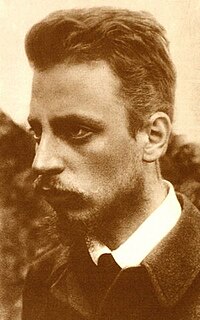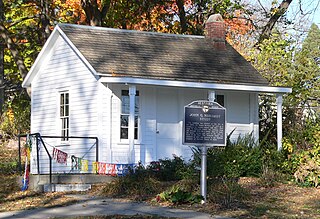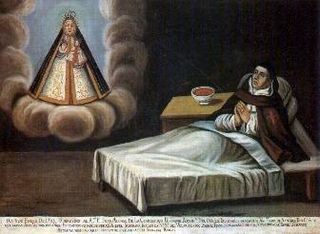External links
- The Divine Enchantment at the Internet Archive.

The Divine Enchantment is John Neihardt's earliest narrative poem, first published in 1900. The poem is divided into ten cantos, and uses a variety of rhyming styles.
When the Princess Devanaguy falls into a deep trance-like sleep, she is visited by the god Vishnu: who causes her to fall pregnant with his holy child, Christna. [1]
Devanaguy's sleep is prolonged supernaturally by Vishnu: allowing the god to relate to her his divine secrets through a series of ecstatic visions. Among the mysteries revealed to Devanaguy, she is shown how the gods will shortly powerfully intervene directly in human affairs. When the princess finally re-awakens she is awestruck by her experiences, and bursts into a spontaneous rhapsody of praise. [2]

René Karl Wilhelm Johann Josef Maria Rilke, better known as Rainer Maria Rilke, was a Bohemian-Austrian poet and novelist. He is "widely recognized as one of the most lyrically intense German-language poets". He wrote both verse and highly lyrical prose. Several critics have described Rilke's work as "mystical". His writings include one novel, several collections of poetry and several volumes of correspondence in which he invokes images that focus on the difficulty of communion with the ineffable in an age of disbelief, solitude and anxiety. These themes position him as a transitional figure between traditional and modernist writers.

Paradise Lost is an epic poem in blank verse by the 17th-century English poet John Milton (1608–1674). The first version, published in 1667, consists of ten books with over ten thousand lines of verse. A second edition followed in 1674, arranged into twelve books with minor revisions throughout. It is considered by critics to be Milton's major work, and it helped solidify his reputation as one of the greatest English poets of his time.

Bancroft is a village in Cuming County, Nebraska, United States. The population was 495 at the 2010 census.
Lúthien and Beren are fictional characters in the fantasy-world Middle-earth of the English author J. R. R. Tolkien. She is an elf, daughter of Thingol and Melian. He is a mortal man. The complex tale of their love for each other and the quest they are forced to follow, triumphing against overwhelming odds but ending in tragedy, appears in The Silmarillion, the epic poem The Lay of Leithian, the Grey Annals section of The War of the Jewels, and in other texts in Tolkien's legendarium, where it plays a central part. Their story is told to Frodo by Aragorn in The Lord of the Rings.
The Spenserian stanza is a fixed verse form invented by Edmund Spenser for his epic poem The Faerie Queene (1590–96). Each stanza contains nine lines in total: eight lines in iambic pentameter followed by a single 'alexandrine' line in iambic hexameter. The rhyme scheme of these lines is ABABBCBCC.

Sleeping Beauty, or Little Briar Rose, also titled in English as The Sleeping Beauty in the Woods, is a classic fairy tale about a princess who is cursed to sleep for a hundred years by an evil fairy, where she would be awakened by a handsome prince. When the good fairy hears this she knew that the princess would be frightened if she found herself alone when she wakes up, so the fairy uses her wand to put every living person and animal in the palace to sleep until the princess awakes.
Heȟáka Sápa, commonly known as Black Elk, was a wičháša wakȟáŋ and heyoka of the Oglala Lakota people. He was a second cousin of the war leader Crazy Horse.

A demigod or demi-god is a minor deity, or a mortal or immortal who is the offspring of a god and a human, or a figure who has attained divine status after death.
John Gneisenau Neihardt was an American writer and poet, amateur historian and ethnographer. Born at the end of the American settlement of the Plains, he became interested in the lives of those who had been a part of the European-American migration, as well as the Indigenous peoples whom they had displaced.

Enchantment is an English language fantasy novel written by Orson Scott Card. First published in 1999, the novel is based on the Ukrainian version of Sleeping Beauty and other folk tales. Various forms of magic, potions, and immortal deities also play an important role in the story.

Dark Night of the Soul is a poem written by the 16th-century Spanish mystic and poet St. John of the Cross. The author himself did not give any title to his poem, on which he wrote two book-length commentaries: Ascent of Mount Carmel and The Dark Night.

Andal or Godadevi is the only female Alvar among the 12 Alvar saints of South India. The Alvar saints are known for their affiliation to the Srivaishnava tradition of Hinduism. Active in the 8th-century, with some suggesting 7th-century, Andal is credited with the great Tamil works, Thiruppavai and Nachiar Tirumozhi, which are still recited by devotees during the winter festival season of Margazhi. Andal is an important female figure for women in South India and has inspired women's groups such as Goda Mandali.

Hanuman is a Hindu god and divine monkey (vanara) companion of the god Rama, who wreaked havoc in Lanka. Vanar can be divided into Van and Nar. People who resides in forest.

In Hindu mythology, Kamsa was the tyrant ruler of the Vrishni kingdom with its capital at Mathura. He is the cousin brother of Devaki, the mother of the god Krishna—who slew Kamsa. Kamsa is described as human in early sources and a rakshasa (demon) in the Puranas. His royal house was called Bhoja and another of his names was Bhojapati.

The samudra manthana is one of the best-known episodes in the Hindu philosophy narrated in the Bhagavata Purana, in the Mahabharata and in the Vishnu Purana. The samudra manthana explains the origin of amrita, the nectar of immortality.

Vaḷḷi is a Hindu goddess and the consort of the god Kartikeya.She is a form of Vishnu's daughter Sundaravalli.

Thirumangai Alvar, also spelt as Tirumangai Alvar and Thirumangai Mannan is the last of the 12 Alvar saints of south India, who are known for their affiliation to Vaishnava tradition of Hinduism. He is considered one of the most learned Alvar and the most superior Alvar in the context of composition of verses. He holds the title Narkavi Perumal, the mark of an excellent poet, and Parakala.

Princess Mathilde of Bavaria was the sixth child of Ludwig III of Bavaria and his wife, Maria Theresa of Austria-Este. After her early death, Life-Dreams: The Poems of a Blighted Life, a collection of poems she wrote, was published in 1910.

Besides eight principal queens (Ashtabharya), the Hindu god Krishna, an avatar of the god Vishnu in the Dwapara Yuga (epoch), is described to have many unnamed junior wives. Their number is mentioned as 16,000 or 16,108 in different scriptures. Krishna accepted them as his wives upon their insistence to save themselves from the society who saw them as slaves of the demon king Narakasura. The chief amongst them is sometimes called Rohini. When Krishna slew Narakasura, he accepted all the captive women upon their insistence to safeguard their dignity. After marriage, they all lived in Dwarka, in divine happiness.
Theros is a Magic: The Gathering block, consisting of the expansion sets Theros, Born of the Gods and Journey into Nyx. The block is a "top-down" design inspired by Greek mythology.